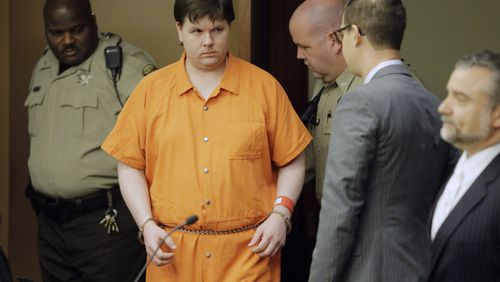Justin Ross Harris on Tuesday launched the appeal of his hot-car murder conviction, alleging that prejudicial testimony admitted by the court made it an “absolute impossibility” for him to receive a fair trial.
The motion for a new trial, filed by Harris’ legal team, is the first step of what is likely to be a lengthy appellate process. The motion condemns court rulings made before and during the sensational trial, such as a decision that prevented the defense from attacking the credibility of Cobb County police officers involved in the investigation.
A jury in Brunswick, where the trial was moved because an impartial jury could not be seated in Marietta, found Harris guilty of intentionally leaving his 22-month-old son Cooper to die in a hot car in June 2014. Last month, Superior Court Judge Mary Staley Clark sentenced Harris to life in prison without the possibility of parole, plus an additional 32 years.
After reviewing Harris’ new filing, Cobb District Attorney Vic Reynolds issued the following statement: “I have complete confidence in the evidence, the trial process and the jury’s verdict in this case, and we will be ready when the defense’s motion for new trial is scheduled for a hearing.”
Harris’ lead trial attorney, Maddox Kilgore, declined to comment. Last month, a new attorney, Mitch Durham of Marietta, was appointed to represent Harris. He could not be reached for comment.
Prosecutors said Harris killed his son so he could be free of his family commitments and sleep with as many people as possible. During the trial, the jury heard testimony from eight women who said they either slept with Harris or exchanged sexually explicit emails, including nude photos, with him. Prosecutors presented such testimony to help provide a motive.
This also included testimony from a woman who was a minor when she and Harris exchanged lewd emails. And the jury convicted Harris of three separate counts — essentially child pornography charges — for the emails he exchanged with the underage girl.
Staley Clark should have allowed Harris to be tried separately for the three charges involving the teenage girl, because her testimony was too inflammatory, the motion said. It also said the jury should not have been allowed to hear evidence of Harris’ sexual dalliances with the other women because prosecutors “made no connection whatsoever between these specific acts of infidelity and an intent to murder his child.”
The evidence involving Cooper’s death was bad enough, the motion said. It included “ghoulish images of a dead child with his eyes open” and “macabre autopsy photographs.”
Allowed to present the additional “bad character” evidence detailing Harris’ sexual promiscuity, prosecutors showed jurors photos of Harris’ genitals and email exchanges that “involved the most prurient and crass of language,” the motion said. Such evidence “assured an unfair and unduly prejudicial atmosphere corrupting any suggestion that Ross Harris could be fairly judged on the actual evidence (or lack thereof) as to the murder and cruelty charges.”
The motion also said Staley Clark should have allowed the defense to question detectives about statements made under oath when they obtained search warrants early in case. This hamstrung the defense because, from the outset, it told jurors it was going to challenge the credibility of Cobb police, the motion said.
For example, Det. Shawn Murphy testified before a magistrate that Harris had said he’d “researched, through the internet, child deaths inside vehicles” and “how long it takes someone to die in a vehicle, what’s the temperature it needs to be.”
Harris never made such statements, the motion said.
The filing also said Staley Clark should not have required a defense expert, psychologist David Diamond, to turn over notes of his interviews with Harris to the prosecution. Diamond, who has coined the term “Forgotten Baby Syndrome,” was expected to take the stand and explain how a parent can leave a child in a car by accident.
Allowing prosecutors to have Diamond’s notes put Harris’ defense team in an “untenable position,” the motion said. The defense chose not to call Diamond to give his expert testimony.
About the Author







